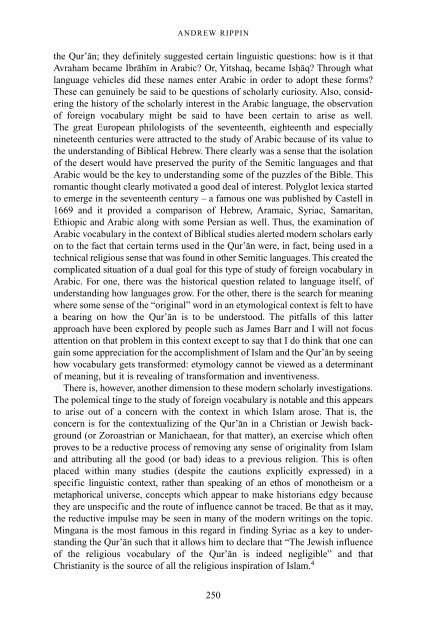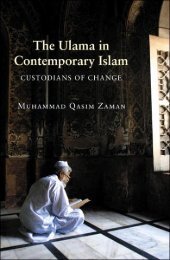The Qur'an in its historical context (pdf - Islam and Christian-Muslim ...
The Qur'an in its historical context (pdf - Islam and Christian-Muslim ...
The Qur'an in its historical context (pdf - Islam and Christian-Muslim ...
Create successful ePaper yourself
Turn your PDF publications into a flip-book with our unique Google optimized e-Paper software.
ANDREW RIPPIN<br />
the Qur’an; they def<strong>in</strong>itely suggested certa<strong>in</strong> l<strong>in</strong>guistic questions: how is it that<br />
Avraham became Ibrahim <strong>in</strong> Arabic? Or, Y<strong>its</strong>haq, became Ishaq? Through what<br />
language vehicles did these names enter Arabic <strong>in</strong> order to adopt these forms?<br />
<strong>The</strong>se can genu<strong>in</strong>ely be said to be questions of scholarly curiosity. Also, consider<strong>in</strong>g<br />
the history of the scholarly <strong>in</strong>terest <strong>in</strong> the Arabic language, the observation<br />
of foreign vocabulary might be said to have been certa<strong>in</strong> to arise as well.<br />
<strong>The</strong> great European philologists of the seventeenth, eighteenth <strong>and</strong> especially<br />
n<strong>in</strong>eteenth centuries were attracted to the study of Arabic because of <strong>its</strong> value to<br />
the underst<strong>and</strong><strong>in</strong>g of Biblical Hebrew. <strong>The</strong>re clearly was a sense that the isolation<br />
of the desert would have preserved the purity of the Semitic languages <strong>and</strong> that<br />
Arabic would be the key to underst<strong>and</strong><strong>in</strong>g some of the puzzles of the Bible. This<br />
romantic thought clearly motivated a good deal of <strong>in</strong>terest. Polyglot lexica started<br />
to emerge <strong>in</strong> the seventeenth century – a famous one was published by Castell <strong>in</strong><br />
1669 <strong>and</strong> it provided a comparison of Hebrew, Aramaic, Syriac, Samaritan,<br />
Ethiopic <strong>and</strong> Arabic along with some Persian as well. Thus, the exam<strong>in</strong>ation of<br />
Arabic vocabulary <strong>in</strong> the <strong>context</strong> of Biblical studies alerted modern scholars early<br />
on to the fact that certa<strong>in</strong> terms used <strong>in</strong> the Qur’an were, <strong>in</strong> fact, be<strong>in</strong>g used <strong>in</strong> a<br />
technical religious sense that was found <strong>in</strong> other Semitic languages. This created the<br />
complicated situation of a dual goal for this type of study of foreign vocabulary <strong>in</strong><br />
Arabic. For one, there was the <strong>historical</strong> question related to language <strong>its</strong>elf, of<br />
underst<strong>and</strong><strong>in</strong>g how languages grow. For the other, there is the search for mean<strong>in</strong>g<br />
where some sense of the “orig<strong>in</strong>al” word <strong>in</strong> an etymological <strong>context</strong> is felt to have<br />
a bear<strong>in</strong>g on how the Qur’an is to be understood. <strong>The</strong> pitfalls of this latter<br />
approach have been explored by people such as James Barr <strong>and</strong> I will not focus<br />
attention on that problem <strong>in</strong> this <strong>context</strong> except to say that I do th<strong>in</strong>k that one can<br />
ga<strong>in</strong> some appreciation for the accomplishment of <strong>Islam</strong> <strong>and</strong> the Qur’an by see<strong>in</strong>g<br />
how vocabulary gets transformed: etymology cannot be viewed as a determ<strong>in</strong>ant<br />
of mean<strong>in</strong>g, but it is reveal<strong>in</strong>g of transformation <strong>and</strong> <strong>in</strong>ventiveness.<br />
<strong>The</strong>re is, however, another dimension to these modern scholarly <strong>in</strong>vestigations.<br />
<strong>The</strong> polemical t<strong>in</strong>ge to the study of foreign vocabulary is notable <strong>and</strong> this appears<br />
to arise out of a concern with the <strong>context</strong> <strong>in</strong> which <strong>Islam</strong> arose. That is, the<br />
concern is for the <strong>context</strong>ualiz<strong>in</strong>g of the Qur’an <strong>in</strong> a <strong>Christian</strong> or Jewish background<br />
(or Zoroastrian or Manichaean, for that matter), an exercise which often<br />
proves to be a reductive process of remov<strong>in</strong>g any sense of orig<strong>in</strong>ality from <strong>Islam</strong><br />
<strong>and</strong> attribut<strong>in</strong>g all the good (or bad) ideas to a previous religion. This is often<br />
placed with<strong>in</strong> many studies (despite the cautions explicitly expressed) <strong>in</strong> a<br />
specific l<strong>in</strong>guistic <strong>context</strong>, rather than speak<strong>in</strong>g of an ethos of monotheism or a<br />
metaphorical universe, concepts which appear to make historians edgy because<br />
they are unspecific <strong>and</strong> the route of <strong>in</strong>fluence cannot be traced. Be that as it may,<br />
the reductive impulse may be seen <strong>in</strong> many of the modern writ<strong>in</strong>gs on the topic.<br />
M<strong>in</strong>gana is the most famous <strong>in</strong> this regard <strong>in</strong> f<strong>in</strong>d<strong>in</strong>g Syriac as a key to underst<strong>and</strong><strong>in</strong>g<br />
the Qur’an such that it allows him to declare that “<strong>The</strong> Jewish <strong>in</strong>fluence<br />
of the religious vocabulary of the Qur’an is <strong>in</strong>deed negligible” <strong>and</strong> that<br />
<strong>Christian</strong>ity is the source of all the religious <strong>in</strong>spiration of <strong>Islam</strong>. 4<br />
250



